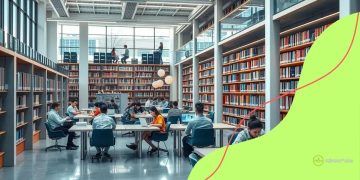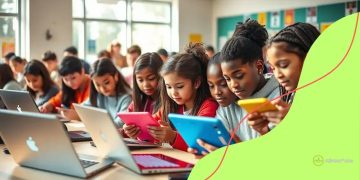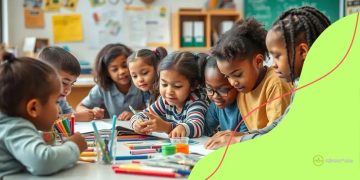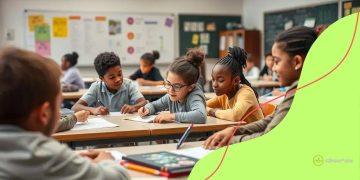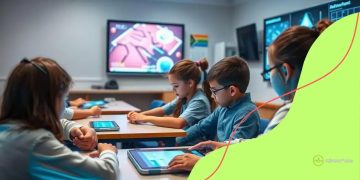The role of libraries in modern education
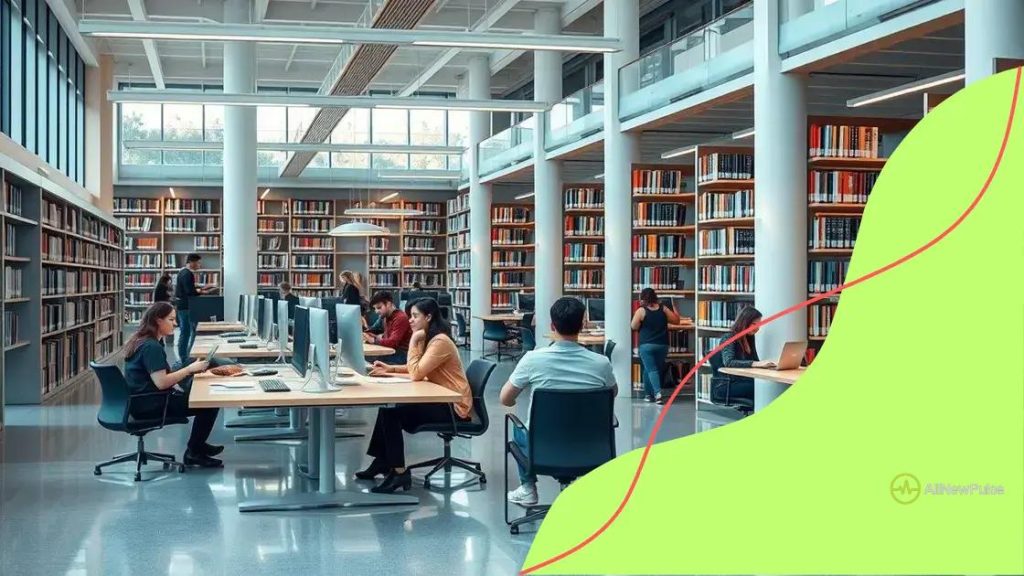
The role of libraries in modern education is to enhance research skills, provide access to digital resources, support literacy, engage the community, and adapt to new technologies, making them essential hubs for learning and growth.
The role of libraries in modern education is more significant than ever as they adapt to new learning environments. Have you ever wondered how these spaces influence student engagement and knowledge access? Let’s delve into their impact.
Enhancing student research skills
Enhancing student research skills is essential in today’s fast-paced information age. Libraries play a crucial role in providing the tools and resources necessary for students to hone these skills. They create environments that foster inquiry and critical thinking, allowing students to explore various topics deeply.
Access to Diverse Resources
One of the greatest advantages of libraries is the access they provide to a wide range of materials. Students can utilize:
- Books in various formats, including e-books.
- Academic journals that contain peer-reviewed research.
- Online databases for comprehensive information.
- Reference materials for quick facts and data.
This access empowers students to delve deeper into subjects and broaden their understanding. In addition, libraries often offer workshops on how to effectively use these resources, giving students a solid foundation in research skills.
Guidance from Librarians
Another significant aspect is the expertise of librarians. They guide students on how to:
- Identify credible sources.
- Develop effective search strategies.
- Utilize citation tools.
Librarians are trained to assist students in navigating complex information landscapes. By working closely with a librarian, students can refine their research questions and improve their overall research strategies.
Moreover, libraries often host research clinics or study groups. These collaborative environments allow students to seek assistance and learn from one another, promoting a community of learning. With the combined support of resources, librarian guidance, and peer collaboration, students are better equipped to succeed in their academic endeavors.
Providing access to digital resources
Providing access to digital resources is vital in today’s educational landscape. Libraries have transformed into hubs of digital information, offering students the tools they need to succeed. Digital resources include e-books, online databases, and educational websites that can be accessed from anywhere, making learning more flexible than ever.
What Libraries Offer
Digital resources open up a world of information for students. Libraries often provide:
- E-books that students can read on their devices.
- Online databases that contain academic journals and articles.
- Streaming media for educational videos and documentaries.
- Virtual tours of museums and other educational sites.
This access ensures that students can conduct research without the limitations of physical books. They can find information quickly and efficiently, enhancing their learning experience.
The Importance of Digital Literacy
Along with access, libraries play a crucial role in developing digital literacy skills. Students learn how to effectively navigate online resources, evaluate sources, and synthesize information from various platforms. This skill set is essential for success in the modern workforce. Libraries often host workshops on digital literacy, helping students become proficient in using these tools wisely.
Moreover, providing access to digital resources encourages collaboration among students. They can share insights and resources easily, making group projects more effective and engaging. With the support of libraries, students are better equipped to tackle their studies and explore new areas of interest.
Supporting literacy and lifelong learning

Supporting literacy and lifelong learning is a fundamental role of libraries in modern education. Libraries are more than just a collection of books; they serve as community centers that promote reading, learning, and exploration throughout life.
Programs and Workshops
Many libraries offer programs tailored to different age groups. These include:
- Story times for young children that encourage a love for reading.
- Adult literacy classes that help improve reading and writing skills.
- Workshops on topics like technology use, resume writing, and personal finance.
These initiatives not only enhance literacy levels but also empower individuals with skills that are essential in today’s world.
Encouraging Reading Habits
Libraries curate collections to cater to diverse interests, helping to foster a reading culture. By hosting book clubs and reading challenges, they encourage patrons to engage with literature and connect with peers. Having access to a variety of genres and formats, such as graphic novels and audiobooks, makes reading more appealing to a wider audience.
Furthermore, libraries collaborate with schools to support students’ literacy through programs that integrate reading into classroom activities. They provide resources like reading lists and author visits, enabling students to discover new authors and genres. By creating a community around reading, libraries encourage lifelong learners to continue exploring new knowledge and ideas.
Through these efforts, libraries actively engage all community members, promoting a culture of learning and support that lasts a lifetime. They play a pivotal role in developing literacy skills, ultimately contributing to personal growth and community well-being.
Facilitating community engagement
Facilitating community engagement is a vital aspect of libraries in modern education. Libraries serve as communal spaces where individuals from different backgrounds can come together to learn, share, and grow. This engagement fosters a sense of belonging and encourages collaboration within the community.
Events and Activities
Libraries host a variety of events aimed at bringing the community together. These include:
- Book fairs that promote local authors and encourage reading.
- Workshops on various topics, from technology to gardening.
- Discussion panels that feature experts on relevant social issues.
- Cultural celebrations that highlight local heritage and diversity.
These activities not only engage community members but also encourage them to take part in lifelong learning.
Partnerships with Local Organizations
Libraries often partner with schools, nonprofits, and community groups to enhance their offerings. Through these partnerships, they can provide resources and services that align with community needs. Such collaborations help to:
- Expand access to learning opportunities.
- Address social issues through informative programs.
- Foster a network of support for community initiatives.
By working together, libraries and local organizations create an environment that nurtures education and civic involvement.
Additionally, libraries provide spaces for community meetings, allowing groups to gather and discuss important issues. By facilitating these interactions, libraries reinforce their role as essential community hubs. This engagement not only strengthens civic ties but also encourages a culture of participation and responsibility among residents.
Adapting to technology and innovation
Adapting to technology and innovation is crucial for libraries to remain relevant in modern education. With the rapid advancement of technology, libraries are evolving to meet the changing needs of their users. This adaptation ensures that they provide valuable resources in an increasingly digital world.
Integration of Digital Tools
Today, libraries are incorporating various digital tools to enhance the learning experience. They now offer:
- Online catalogs that allow users to search and reserve materials remotely.
- Mobile apps for convenient access to library resources.
- Virtual reference services to assist users in real time.
- E-learning platforms that provide access to webinars and online courses.
By embracing these technologies, libraries empower students and community members to engage with information anytime and anywhere.
Innovative Learning Spaces
Libraries are transforming physical spaces to accommodate new educational needs. They create flexible areas that support:
- Group collaboration with comfortable seating and technology hubs.
- Maker spaces for hands-on learning with tools like 3D printers and audio-visual equipment.
- Quiet zones for focused study and research.
These learning environments foster creativity and collaboration, making libraries dynamic places for discovery.
Additionally, libraries are updating their collections to include the latest materials on technology and innovation. They provide access to resources on programming, digital literacy, and emerging technologies, ensuring that patrons are well-informed and prepared for the future. By adapting to technological changes, libraries not only enhance their offerings but also encourage a culture of lifelong learning among community members.
FAQ – Frequently Asked Questions about the Role of Libraries in Modern Education
How do libraries enhance student research skills?
Libraries provide access to a variety of resources, including books and online databases, helping students develop essential research skills.
What digital resources do libraries offer?
Libraries offer e-books, online journals, and educational websites that allow users to access information from anywhere.
How do libraries support community engagement?
Libraries host events and workshops that bring community members together, fostering collaboration and lifelong learning.
In what ways are libraries adapting to technology?
Libraries are incorporating digital tools, creating innovative spaces, and providing resources on emerging technologies to meet educational needs.
